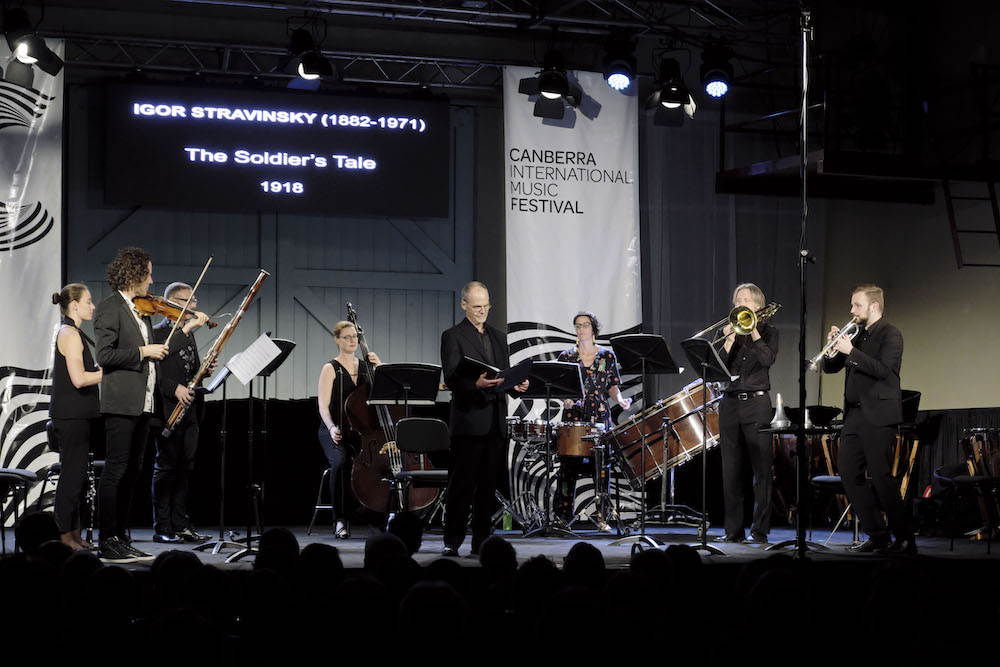Fitters’ Workshop, Canberra
May 4, 2018
Like Ulysses Now on Wednesday night, the 17th concert at the Canberra International Music Festival, A Soldier’s Return, was a thoughtful and intelligent program, tapping deeply into the festival’s theme of Return, a century on from the end of the First World War.
 A Soldier’s Return at Canberra International Music Festival. Photo © Peter Hislop
A Soldier’s Return at Canberra International Music Festival. Photo © Peter Hislop
The first half of the concert explored the experiences of returned servicemen and women in a moving series of poems, written by participants from the Australian Defence Force Arts for Recovery, Resilience, Teamwork and Skills Program – a program for serving wounded, injured or ill members of the ADF – Bec Lally, Phil Courtney, Elissa Croker, Heath Schofield, Brad Mackay and Scott Grainger.
The seven poems, narrated by Paul English, explored concepts from identity (such as Lally’s powerful All for the price of your worthless self) to the experiences of Defence Force men and women when they return home (Croker’s deeply felt Six Human Emotions) and the vivid intensity of working in a combat zone (Mackay’s piercing My Kabul Job).
Between the poems, Artistic Director of ADF ARRTS Geoff Grey led his Canberra Wind Symphony in a smart program of musical responses to conflict, a series of works from Peter Meechan’s Letters for Home to David Holsinger’s In the Spring, at the time when Kings go off to war, Samuel Hazo’s Chorus Angelorum and James Barnes’ Lonely Beach. While at times almost unrelentingly bombastic – the use of snare and bass drum as artillery and machine gun fire was a thread woven through much of the program – there was also an undercurrent of ceremony and spiritual reflection, with chanting vocalisations another recurring colour.
This almost religious atmosphere was particularly prominent in the world premiere on the program, Jodie Blackshaw’s The Bitter and the Sweet, which followed Schofield’s heartrending Not My Choice and drew allusions to the Last Post in its haloed nods to the harmonic series. Blackshaw’s multi-hued work, which featured prominent lines from cor anglais, bassoon and flute, is part of a larger work based on Michael Leunig’s Prayer Book, and reflects on Australians who fell in France during the Battle of Hamel in 1918. The final bars are a miasma of wind sound, blown without pitch through the instruments, traces of the Last Post emerging from the mist.
After the intense emotion of the concert’s first half, the second was given over to a lighter, more fantastic, depiction of soldiery in Stravinsky’s Histoire du Soldat – or The Soldier’s Tale – premiered exactly a century ago in September. English once again took the stage as narrator, taking on the roles of devil and soldier, alongside a septet (who played without conductor) led by Tim Fain on violin, featuring Jacqueline Dosser on double bass, Magdalenna Krstevska on clarinet, Ben Hoadley on bassoon, Fletcher Cox on trumpet, Nigel Crocker on trombone and Claire Edwardes on percussion.
While the dancer Stravinsky called for was absent, Fain’s performance was more than virtuosic enough to sustain visual interest and his duetting with Edwardes across the ensemble – particularly in the final Devil’s march – was fantastically dance-like in itself.
The ensemble put in a fine performance, the complex rhythms and shifting metres of the Stravinsky tracing an idea back to the Holsinger earlier in the program, but Fain was the star in this piece, his performance as fiendish as it was brilliant. But for all the humour of the work – and English’s narration was a delight, his Peter and the Wolf on Sunday will no doubt be wonderful – the idea that the past is a place to which one cannot return created a forceful resonance with the first half of the concert. The concepts explored in this concert linger, troublingly, in the memory long after the ominous final notes from Edwardes’ drums have faded out.
Canberra International Music Festival takes place in venues across Canberra until May 6











Comments
Log in to join the conversation.